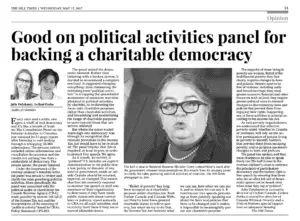The current broken system prevents us from speaking out about bad policy, and makes it impossible to meaningfully pursue our charitable purpose.
This piece originally ran in the May 17th issue of the Hill Times and is available on their website.
By JULIE DELAHANTY, LEILANI FARHA
PUBLISHED : Wednesday, May 17, 2017 12:00 AM
Every once and a while, one gets a whiff of real democracy and it’s like a breath of fresh air. The Consultation Panel on the Political Activities of Charities just released its 31-page report, after listening to and wading through a whopping 20,000 submissions. The process (which included online submissions and roundtable discussions) and the results are nothing less than a celebration of democracy. The people spoke: the panel listened.
Under the framework of the revenue minister’s mandate letter, the panel was struck to review and clarify the rules governing political activities. More specifically, the panel was concerned with the political audits of charities by the Canada Revenue Agency (CRA), made possible by section 149.1(6.2) of the Income Tax Act, and the interpretation of the meaning of “political activity” found in CRA’s Policy Statement CPS-022.
The panel seized the democratic moment. Rather than tinkering with a broken system, it decided to recommend a complete overhaul. It suggested changing everything: from  eliminating the confusing term “political activities,” to scrapping the quantitative assessment of resources and time allocated to political activities by charities, to re-directing the focus onto charitable purposes rather than charitable activities, and broadening and modernizing the range of charitable purposes to move beyond those that are service oriented.
eliminating the confusing term “political activities,” to scrapping the quantitative assessment of resources and time allocated to political activities by charities, to re-directing the focus onto charitable purposes rather than charitable activities, and broadening and modernizing the range of charitable purposes to move beyond those that are service oriented.
But where the panel waded waist-high into democracy was through its recognition that relevant provisions in the Income Tax Act would have to be re-drafted. The panel implies that this is required, at least in part, in order to protect free speech. We agree.
As it stands, an activity is “political” if it includes an explicit communication to the public that a law, policy, or decision of any level of government inside or outside Canada should be retained, opposed, or changed. This means charities are currently required to monitor the speech of staff and members of their organization to determine if they have made public statements about current laws or policies, report annually to CRA on all such activities, and to strictly limit them if they are to exceed allowable levels.
“Relief of poverty” has long been accepted as a charitable purpose under charities law. Both Oxfam Canada and Canada Without Poverty have been granted charitable status to relieve poverty, but when we try to do that, the Income Tax Act restricts what we can say, how often we can say it, and to whom we can say it. It restricts our free speech, preventing us from publicly speaking out about the laws and policies that have to be changed and it makes it impossible to meaningfully pursue our charitable purpose.
The majority of those living in poverty are women. Relief of the multifaceted poverty they face clearly requires changes to laws and policies. Women need to be free of violence, including early and forced marriage; they need greater access to financial and other resources such as land; they require greater political voice to demand changes to discriminatory laws and policies that prevent them from enjoying their rights. Supporting any of these activities is political according to the Income Tax Act.
As anti-poverty organizations, we understand that effective poverty relief, whether in Canada or overseas, will rely on the active participation of people living in poverty to identify barriers that prevent them from escaping poverty and to propose necessary changes to laws and policies.
The panel has spoken, and they want charities to be able to speak freely too. The ball is now in the revenue minister’s court to embrace the principles of participatory democracy and the human right to free speech by ensuring that those who are so often left out of democratic spaces can be heard, even when what they say is “political.”
Julie Delahanty is executive director of Oxfam Canada. Leilani Farha is executive director of Canada Without Poverty and a United Nations special rapporteur on adequate housing.
The Hill Times

